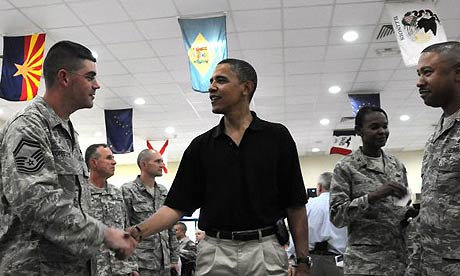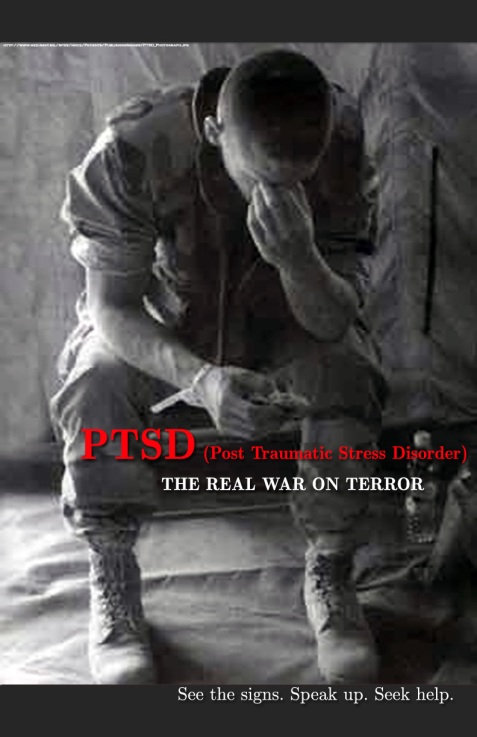
- President Barack Obama with troops in the Middle East. http://static.guim.co.uk/sys-images/Guardian/Pix/pictures/2008/07/20/obama20a.jpg
By: Juan C. González Seda
“I would gladly order every single one of our troops home tomorrow. So no, I do not make this decision lightly. I make this decision because I am convinced that our security is at stake in Afghanistan”, said U.S. President Barack Obama, as stated in the website SFGATE.com
Obama’s strategy focuses on increasing the number of troops to 134,000 so that the U.S. forces can further the training of afghan troops. In time, says Obama, this can “help create the conditions for the U.S. to transfer responsibility to the Afghans.” Also, the troops are necessary to prevent the country from falling into the hands of the Taliban, said the new U.S. commander, General Stanley McChrystal, in the website SFGATE.com
Obama’s decision was the result of a three-month review, once it was clear that the 21,000 troops he added last spring were not winning the war. The plan is to bring the troops home beginning in July 2011. But the U.S. spokesman, Brigadier General Stephen Lanza, said that “the real aim was to get the troops out of Iraq by August, still leaving behind 50,000 troops to support the Iraqis.”
As troops return from the battlefield, the U.S. military faces the dilemma of diagnosing and treating PTSD: post traumatic stress disorder. “According to the latest Pentagon study, published in 2004, about one in six veterans of the Iraq and Afghanistan wars suffers from PTSD, depression or anxiety”, states CNN.com.
Of the 244,054 veterans of Iraq and Afghanistan already discharged from service, 12,422 have been in Veterans Affairs counseling centers for readjustment problems and symptoms associated with PTSD. It is difficult to compare to past wars because emotional problems are often ignored or written off as “combat fatigue” or “shell shock.” PTSD wasn’t even an official diagnosis until after Vietnam. It emerges in men and women who have gone through a traumatic event that provoked intense fear, helplessness, deep guilt, extreme stress or horror, states CNN.com.
According to the website ELSEVIERHEALTH.com, post traumatic stress disorder is an anxiety disorder. Sufferers tend to re-experience traumatic events obsessively, have flashbacks, intrusive thoughts, and nightmares. As a result they incur in avoidant behaviors, like fear of being around people, conscious trigger avoidance, drug abuse and alcoholism.

Indicators of PTSD. http://4.bp.blogspot.com/_b9qNoeZofgM/s320/ptsd.png
“You get used to scanning what everybody’s doing. Your brain just starts working so fast and it’s purely instinctual because you want to know what everyone’s intent is around you,” said Private Goldsmith, who served four years on active duty. That hyper-vigilance is one common symptom of post-traumatic stress disorder, said CNN.com. “I was a 19-year-old kid taking pictures of mutilated men, women and boys and little girls. Those are the type of images that never really go away,” recalled Goldsmith, and stated in UTVET.com.
Private Goldsmith is just one example of the thousands of soldiers going through difficult times in the military. The frequent deployments, the short notice mobilizations, the distancing from loved ones, and the stress of the job all add up and contribute to the stress disorders that are so often seen nowadays.
Furthermore, as stated in CNN.com, the situation is aggravated when stop-loss comes in effect. Many people in the military nearing their separation date are faced with the news that they have been involuntarily extended beyond their contract. “Those stop-loss orders were saying that I was going to deploy to Iraq the same week that I was supposed to be getting out of the Army,” Goldsmith said, in UTVET.com.
PTSD is difficult to recognize, soldiers are socialized to believe that admitting to feeling bad is weak and that seeking professional help is stigmatized. The problem is so serious that “only about a third of afflicted soldiers come to me for treatment. Most of them are discouraged by what their peers or higher ups might think of them”, said Dr. Pagán Viera, a psychologist with the Department of Veterans Affairs during an interview.
“When people enter my office, I can tell that the ones that shy away from the group in a corner, or seem particularly alienated or irritable have PTSD, because I’ve been trained to identify these types of signs on soldiers as signs of the condition.” When asked what the tell-tale signs of PTSD were, Dr. Viera said “patients seem tense, alienated, and emotionally detached. When having a conversation with them, they engage in egocentric topics and behaviors, and often irritate very easily. Also in most cases they are deeply troubled and depressed. They have poor concentration but remain alert to threats.”
Still this is just the tip of the iceberg when it comes to identifying the condition, and if anyone is worried they must know that it is normal to be stressed, because they have gone through a stressful situation. “It’s nothing to be ashamed of. Seek professional help”, said Viera.
Arroyo says he has seen fellow airmen and students having a hard time coping with stress, and not only the military stress but the stress from college also, and some even do not want to be talked to; they just choose to alienate themselves as a defensive mechanism. At the university we have the Medical Services department where we can go and seek help if we need it. There is a life skills section and a section with great psychologists to help you cope with any difficult situations you may have.
“I use positive reinforcement to forget about any possible stressors and it works perfectly, it also keeps me from doing bad in my classes”, said Arroyo, but finally added “if you definitively can not deal with the situation on your own then seek help, it is there for you”. The Medical Services department at the University of Puerto Rico-Mayagüez can be reached at (787) 832-4040 extensions 3408 and 3416.

Uncle Sam on PTSD. The government cares about you. http://blogs.psychcentral.com/channeln/wp-content/uploads/2008/04/ptsd.jpg

Leave a comment